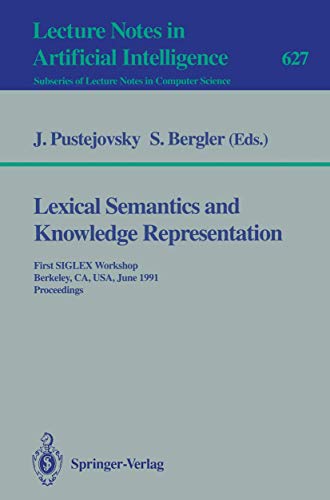Verwandte Artikel zu Lexical Semantics and Knowledge Representation: First...
Lexical Semantics and Knowledge Representation: First SIGLEX Workshop, Berkeley, CA, USA, June 17, 1991. Proceedings: 627 (Lecture Notes in Computer Science) - Softcover

Inhaltsangabe
Recent work on formal methods in computational lexical semantics has had theeffect of bringing many linguistic formalisms much closer to the knowledge representation languages used in artificial intelligence. Formalisms are now emerging which may be more expressive and formally better understood than many knowledge representation languages. The interests of computational linguists now extend to include such domains as commonsense knowledge, inheritance, default reasoning, collocational relations, and even domain knowledge. With such an extension of the normal purview of "linguistic" knowledge, one may question whether there is any logical justification for distinguishing between lexical semantics and commonsense reasoning. This volume explores the question from several methodologicaland theoretical perspectives. What emerges is a clear consensus that the notion of the lexicon and lexical knowledge assumed in earlier linguistic research is grossly inadequate and fails to address the deeper semantic issues required for natural language analysis.
Die Inhaltsangabe kann sich auf eine andere Ausgabe dieses Titels beziehen.
Reseña del editor
Recent work on formal methods in computational lexical semantics has had theeffect of bringing many linguistic formalisms much closer to the knowledge representation languages used in artificial intelligence. Formalisms are now emerging which may be more expressive and formally better understood than many knowledge representation languages. The interests of computational linguists now extend to include such domains as commonsense knowledge, inheritance, default reasoning, collocational relations, and even domain knowledge. With such an extension of the normal purview of "linguistic" knowledge, one may question whether there is any logical justification for distinguishing between lexical semantics and commonsense reasoning. This volume explores the question from several methodologicaland theoretical perspectives. What emerges is a clear consensus that the notion of the lexicon and lexical knowledge assumed in earlier linguistic research is grossly inadequate and fails to address the deeper semantic issues required for natural language analysis.
„Über diesen Titel“ kann sich auf eine andere Ausgabe dieses Titels beziehen.
Gratis für den Versand innerhalb von/der Deutschland
Versandziele, Kosten & DauerNeu kaufen
Diesen Artikel anzeigenGratis für den Versand innerhalb von/der Deutschland
Versandziele, Kosten & DauerSuchergebnisse für Lexical Semantics and Knowledge Representation: First...
Lexical Semantics and Knowledge Representation : First SIGLEX Workshop, Berkeley, CA, USA, June 17, 1991. Proceedings
Anbieter: Buchpark, Trebbin, Deutschland
Zustand: Gut. Zustand: Gut | Seiten: 400 | Sprache: Englisch | Produktart: Bücher. Artikel-Nr. 537666/3
Anzahl: 1 verfügbar
Lexical Semantics and Knowledge Representation : First SIGLEX Workshop, Berkeley, CA, USA, June 17, 1991. Proceedings
Anbieter: AHA-BUCH GmbH, Einbeck, Deutschland
Taschenbuch. Zustand: Neu. Druck auf Anfrage Neuware - Printed after ordering - Recent work on formal methods in computational lexicalsemantics has had theeffect of bringing many linguisticformalisms much closer to the knowledge representationlanguages used in artificial intelligence. Formalisms arenow emerging which may be more expressive and formallybetter understood than many knowledge representationlanguages. The interests of computational linguists nowextend to include such domains as commonsense knowledge,inheritance, default reasoning, collocational relations, andeven domain knowledge. With such an extension of the normalpurview of 'linguistic' knowledge, one may question whetherthere is any logical justification for distinguishingbetween lexical semantics and commonsense reasoning.This volume explores the question from severalmethodologicaland theoretical perspectives. What emerges isa clear consensus that the notion of the lexicon and lexicalknowledge assumed in earlier linguistic research is grosslyinadequate and fails to address the deeper semantic issuesrequired for natural language analysis. Artikel-Nr. 9783540558019
Anzahl: 1 verfügbar
Lexical Semantics and Knowledge Representation: First SIGLEX Workshop, Berkeley, CA, USA, June 17, 1991. Proceedings (Lecture Notes in Computer Science / Lecture Notes in Artificial Intelligence 627)
Anbieter: Ria Christie Collections, Uxbridge, Vereinigtes Königreich
Zustand: New. In. Artikel-Nr. ria9783540558019_new
Anzahl: Mehr als 20 verfügbar

